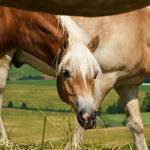Poisoning by Common Pasture Plants

Reports of horses poisoned by pasture plants tend to increase in late fall and early winter, possibly because pasture grasses are less available due to dry conditions and the beginning of dormancy. Unless plenty of appealing hay is provided as safe grazing diminishes, horses will sometimes sample toxic weeds and plants that they might avoid at other times of the year.
Some plant toxins have a cumulative effect, and horses that have eaten a particular weed all summer might begin to show signs of poisoning only after consuming it for several months. To avoid problems, owners should offer hay to pastured horses; suppress weed growth by regular mowing; consult regional agricultural extension offices for guidance on identification and control of dangerous plants; and check with a veterinarian if plant poisoning is suspected.








